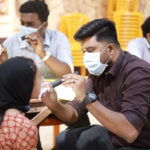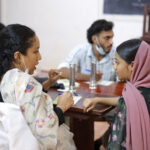AQAR 2021- 2022
2.2.3 – Institution facilitates building and sustenance of innate talent /aptitude of individual students
2.2.3 A – Appropriate documentary evidence
2.2.3 B – Any other relevant information
2.3.3 – Teachers use ICT-enabled tools for effective teaching and learning process including online e-resources
2.3.3 A – Details of ICT-enabled tools used for teaching and learning
2.3.3 B – List of teachers using ICT-enabled tools (including LMS)
2.3.3 C – Webpage describing the “LMS/ Academic Management System”
2.3.5 – The teaching learning process of the institution nurtures creativity, analytical skills and innovation among students
2.3.5 A – Appropriate documentary evidence
2.3.5 B – Any other relevant information
2.5.1 – The Institution adheres to the academic calendar for the conduct of Continuous Internal Evaluation and ensures that it is robust and transparent
2.5.1 A – Academic calendar
2.5.1 B – Dates of conduct of internal assessment examinations
2.5.3 Information on examination reforms
2.6.1 – The Institution has stated the learning outcomes (generic and programme-specific) and graduate attributes as per the provisions of the Regulatory bodies and the University; which are communicated to the students and teachers through the website and other documents
2.6.1 A – Relevant documents pertaining to learning outcomes and graduate attributes
2.6.1 B – Methods of the assessment of learning outcomes and graduate attributes
2.6.1 C – Upload Course Outcomes for all courses (exemplars from Glossary)
2.6.1 D – Any other relevant information
2.6.3 – The teaching learning and assessment processes of the Institution are aligned with the stated learning outcomes. Provide details on how teaching learning and assessment processes are mapped to achieve the generic and program-specific learning outcomes
2.6.3 A – Programme-specific learning outcomes
2.6.4 – Presence and periodicity of parent-teachers meetings, remedial measures undertaken and outcome analysis. Describe structured mechanism for parent-teachers meetings, follow-up action taken and outcome analysis
2.6.4 A – Proceedings of parent –teachers meetings held during the year
2.6.4 B – Follow up reports on the action taken and outcome analysis.
Key Indicator 3.1 – Resource Mobilization for Research
3.1.3 A – Link for funding agencies websites
Key Indicator 3.2- Innovation Ecosystem
3.2.1 A – Details of the facilities and innovations made
Key Indicator 3.4 – Extension Activities
3.4.3 Number of awards and recognitions received for extension and outreach activities
3.4.3 A – List of awards for extension activities in the year
3.4.3 B – e-copies of the award letters
3.4.3 C – Any other relevant information
3.4.4 Institutional social responsibility activities in the neighbourhood community in terms
3.4.4 A – Details of Institutional social responsibility activities in the neighbourhood community during the year
3.4.4 B – Any other relevant information
Key Indicator – 4.1 Physical Facilities
Metric No.4.1.1: The Institution has adequate facilities for teaching-learning. viz., classrooms, laboratories, computing equipment etc.
4.1.1 A – List of available teaching-learning facilities such as Class rooms, Laboratories, ICT enabled facilities including Teleconference facilities etc., mentioned above
4.1.1 B – Geo tagged photographs
Metric No.4.1.2: The Institution has adequate facilities to support physical and recreational requirements of students and staff – sports, games (indoor, outdoor), gymnasium, auditorium, yoga centre, etc.) and for cultural activities
4.1.2 A – List of available sports and cultural facilities
4.1.2 B – Geo tagged photographs
Metric No.4.1.3: Availability and adequacy of general campus facilities and overall ambience
4.1.3 A – Photographs/ Geo tagging of Campus facilities
Key Indicator – 4.2 Clinical, Equipment and Laboratory Learning Resources
Metric No.4.2.1: Teaching Hospital, equipment, clinical teaching-learning and laboratory
facilities as stipulated by the respective Regulatory Bodies
4.2.1 A – The facilities as per the stipulations of the respective Regulatory Bodies with Geo tagging
4.2.1 B – The list of facilities available for patient care, teaching-learning and research
Metric No.4.2.2: Number of patients per year treated as outpatients and inpatients in the
teaching hospital for the year
4.2.2 A – Link to hospital records/ Hospital Management Information System
Key Indicator – 4.3 Library as a learning Resource
Metric No.4.3.1: Library is automated using Integrated Library Management System (ILMS)
4.3.1 A – Geo tagged photographs of library facilities
Metric No.4.3.2: Total number of textbooks, reference volumes, journals, collection of rare books, manuscripts, Digitalized traditional manuscripts, Discipline-specific learning resources from ancient Indian languages, special reports or any other knowledge resource for library enrichment
4.3.2 A – Data on acquisition of books / journals /Manuscripts /ancient books etc., in the library
4.3.2 B – Geotagged photographs of library ambiance
4.3.2 C – Any other relevant information
4.3.5 A – Details of library usage by teachers and students
4.3.5 B – Details of Learners Sessions / Library user programmes organized
4.3.5 C – Any other relevant information
Key Indicator – 4.4 IT Infrastructure
4.4.2 A – Documents related to updation of IT and Wi-Fi facilities
Key Indicator – 4.5 Maintenance of Campus Infrastructure
4.5.2 A – Minutes of the meetings of the Maintenance Committee
4.5.2 B – Log book or other records regarding maintenance works
4.5.2 C – Any other relevant information
5.1.3 – Number of students provided training and guidance for competitive examinations and career counseling offered by the Institution during the year
5.1.3 A – Institutional website. Web-link to particular program/scheme mentioned in the metric
5.1.4 – The Institution has an active international student cell to facilitate study in India program etc.., Describe the international student cell activities
5.1.4 A – For international student cell
5.1.4 B – Any other relevant information
5.1.5 – The Institution has a transparent mechanism for timely redressal of student grievances / prevention of sexual harassment and prevention of ragging
5.1.5 A – Circular/web-link/ committee report justifying the objective of the metric
5.3.2 Reports on the student council activities
5.3.2 Any other relevant information
5.4.1 – The Alumni Association is registered and holds regular meetings to plan its involvement and developmental activates with the support of the college during the year
5.4.1 A – Registration of Alumni association
5.4.1 B – Details of Alumni Association activities
5.4.1 C – Frequency of meetings of Alumni Association with minutes
5.4.1 D – Quantum of financial contribution
5.4.1 E – Audited statement of accounts of the Alumni Association
Key Indicator – 6.1 Institutional Vision and Leadership
Metric no 6.1.1: The Institution has clearly stated Vision and Mission which are reflected in its academic and administrative governance.
6.1.1 A – Vision and Mission documents approved by the College bodies
6.1.1 B – Achievements which led to Institutional excellence
6.1.1 C – Any other relevant information
Metric no 6.1.2: Effective leadership is reflected in various Institutional practices such as decentralization and participative management.
6.1.2 A – Relevant information /documents
6.1.2 B – Any other relevant information
Key Indicator- 6.2 Strategy Development and Deployment
Metric no 6.2.1: The Institution has a well-defined organizational structure, Statutory bodies/committees of the college with relevant rules, norms and guidelines along with Strategic plan effectively deployed.
6.2.1 A – Organisational structure
6.2.1.B – Strategic Plan document(s)
6.2.1 C – Minutes of the College Council/ other relevant bodies for deployment/ deliverables of the strategic plan
6.2.1 D – Any other relevant information
Metric no 6.2.2: Implementation of e-governance in areas of operation.
Key indicator 6.3- Faculty empowerment strategies
Metric no 6.3.1: The Institution has effective welfare measures for teaching and non- teaching staff.
6.3.1 A – Policy document on the welfare measures
6.3.1 B – List of beneficiaries of welfare measures
6.3.1 C – Any other relevant document
Metric no 6.3.2: Number of teachers provided with financial support to attend conferences/workshops and towards membership fee of professional bodies during the year.
Metric no 6.3.3: Number of professional development / administrative training programmes organized by the Institution for teaching and non- teaching/technical staff during the year.
Metric no 6.3.4: Number of teachers undergoing Faculty Development Programmes (FDP) including online programmes during the year (Orientation / Induction Programmes, Refresher Course, Short Term Course etc.)
Metric no 6.3.5: Institution has Performance Appraisal System for teaching and non- teaching staff.
6.3.5 A – Performance Appraisal System
6.3.5 B – Any other relevant information
Key Indicator- 6.4 Financial Management and Resource Mobilization
Metric no 6.4.1: Institutional strategies for mobilisation of funds and the optimal utilisation of resources.
6.4.1 A – Resource mobilization policy document duly approved by College Council/other administrative bodies
6.4.1 B – Procedures for optimal resource utilization
6.4.1 C – Any other relevant information
Metric no 6.4.2: Institution conducts internal and external financial audits regularly.
6.4.2 A – Documents pertaining to internal and external audits for the last year
Metric no 6.4.3: Funds / Grants received from government/non-government bodies, individuals, philanthropists (INR in Lakhs) during the year.
Key Indicator- 6.5 Internal Quality Assurance System
Metric no 6.5.1: Institution has a streamlined Internal Quality Assurance Mechanism.
6.5.1 A – The structure and mechanism for Internal Quality Assurance
6.5.1 B – Minutes of the IQAC meetings
Metric no 6.5.2: Number of teachers attending programs/ workshops/ seminars specific to quality improvement in the year.
Metric no 6.5.3: The Institution adopts several Quality. Assurance initiatives.
6.5.3 A – Copies of AQAR
Key Indicator- 7.1 Institutional Values and Social Responsibilities
7.1 – Institutional Values and Social Responsibilities
7.1.1 – Total number of gender equity sensitization programmes organized by the Institution during the year
7.1.2 – Measures initiated by the Institution for the promotion of gender equity during the year. Describe gender equity & sensitization in curricular and co-curricular activities, facilities for women on campus
7.1.2 A – Annual gender sensitization action plan
7.1.2 B – Specific facilities provided for women in terms of a. Safety and security b. Counselling c. Common Rooms d. Day care centre for young children
7.1.2 C – Any other relevant information
7.1.3 – The Institution has facilities for alternate sources of energy and energy conservation devices 1
7.1.3 A – Geotagged Photos
7.1.4 – Describe the facilities in the Institution for the management of the following types of degradable and non-degradable waste
7.1.4 A – Relevant documents like agreements/MoUs with Government and other approved agencies
7.1.4 B – Geotagged photographs of the facilities
7.1.4 C – Any other relevant information
7.1.5 – Water conservation facilities available in the Institution:
7.1.5 A – Geotagged photos / videos of the facilities
7.1.6 – Green campus initiatives of the Institution include
7.1.6 A – Geotagged photos / videos of the facilities if available
7.1.8 – Describe the Institutional efforts/initiatives in providing an inclusive environment
7.1.9 – The Institution has a prescribed code of conduct for students, teachers, administrators and other staff and conducts periodic programmes in this regard
7.1.9 A – Web link of the code of conduct
Key Indicator- 7.2 Best Practices
7.2.1 – Describe two Institutional Best Practices as per the NAAC format provided in the Manual
7.2.1 A – Best practices page in the Institutional website
7.2.1 B – Any other relevant information
Key Indicator- 7.3 Institutional Distinctiveness
7.3.1 – Portray the performance of the Institution during the year in one area distinctive to its priority
7.3.1 A – Appropriate web page in the institutional website
7.3.1 B – Any other relevant information
8.1.4 Orientation / Foundation courses practiced in the institution for students entering the college /clinics/internship
8.1.4 (A) orientation circular
8.1.4 (B) programme report
8.1.8: The Institution has introduced objective methods to measure and certify attainment of specific clinical competencies by BDS students/interns as stated in the undergraduate curriculum by the Dental Council of India
8.1.8 (A) Report on the list and steps taken by the College
8.1.8 (B)Geotagged photographs of OSCE / OSPE
8.1.8 (C) List of Competencies
8.1.8 (D) Relevant information
8.1.10: The College has adopted methods to define and implement Dental graduate attributes with a system of evaluation of attainment of such attributes.
8.1.10(A) Dental graduate attributes as described
8.1.10 (B) Relevant information
8.1.12: Establishment of Dental Education Department by the College for the range and quality of Faculty Development Programmes in emerging trends in Dental Educational Technology organized by it.
8.1.12(A) List of seminars/conferences/workshops on emerging trends in Dental Educational Technology organized by the DEU
8.1.12 (B) List of teachers year-wise who participated
8.1.12 (C) Relevant information



